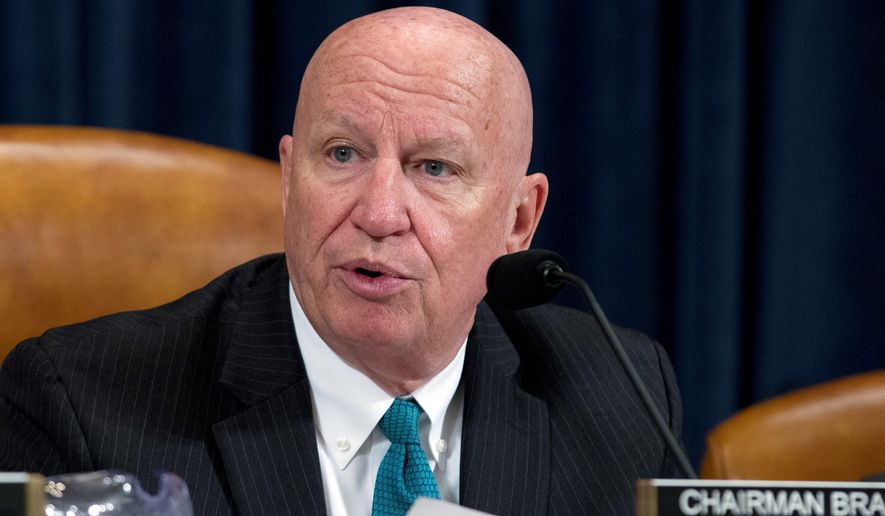A top House Republican on Monday proposed new delays on some of Obamacare’s remaining taxes, hoping to harness bipartisan antipathy to the levies to sweeten a broader package of tax tweaks he has been trying to get passed.
Rep. Kevin Brady, the Republican chairman of the House Ways and Means Committee, called for delaying a tax on health insurers by two more years, pushing it to 2022, called for a five-year delay of a tax on medical device makers, pushing it to 2025, and for a one-year delay of the “Cadillac tax” on generous employer-sponsored plans, to 2023.
Democrats wrote each of those taxes into the 2010 Affordable Care Act to pay for all the goodies — but some Democrats, along with Republicans, have had second thoughts, and the taxes have been delayed several times.
Mr. Brady said he wants to keep that momentum going.
“In the past, these delays in the ACA taxes have been bipartisan and have usually been extended in end-of-year discussions,” the Texas Republican said.
Those provisions are part of a broader tax bill Mr. Brady is desperate to pass. It includes tax relief for states and territories hit by natural disasters, and it tweaks some bungles in the GOP’s massive 2017 tax cut law.
He had hoped the Obamacare delays would entice Democrats to support the plan, but Rep. Richard Neal, the panel’s senior Democrat, will not back it, an aide said.
Mr. Brady acknowledged that a strong Republican vote may be needed to get the bill over to the Senate, which is free to “eliminate any provision that doesn’t have bipartisan support and send it back.”
Senators from both parties have urged Majority Leader Mitch McConnell and Minority Leader Charles E. Schumer to find a way to provide relief from the health insurance tax, or “HIT,” before insurers submit their rate filings to state regulators in early to mid-2019.
“Absent further congressional action, the tax will result in higher insurance premiums throughout insurance markets,” Sen. John Barrasso, Wyoming Republican, said in a recent letter signed by a fellow Republican and two Senate Democrats, Doug Jones of Alabama and Jeanne Shaheen of New Hampshire.
Senate Democrats from places such as Massachusetts and Minnesota also have opposed the medical-device tax, citing the impact on manufacturing hubs back home.
Conservative pressure groups want swift action, too, saying GOP leaders offer the best shot to dent Obamacare before Democrats take the House majority and push tax relief down their list of priorities.
“Republicans have shown a lot of leadership on this and I think it’s safe to say they’re more pro-tax cut, so that’s a good reason to do it now,” said Alex Hendrie, director of tax policy for Americans for Tax Reform, the group led by anti-tax crusader Grover Norquist. “It’s kind of a ’strike while the iron is hot’ viewpoint.”
Congress already zeroed out Obamacare’s most famous tax — the individual mandate penalty for shirking insurance — in the GOP’s tax overhaul last year.
Mr. Brady said delaying the other Obamacare taxes would cost roughly $52 billion for the years he’s proposing.
But budget analysts said once the taxes start getting delayed, they rarely kick in. Mr. Brady’s plan would sap as much as $350 billion from government finances if the Obamacare taxes were delayed throughout a 10-year budget window, according to Marc Goldwein, senior vice president at the nonpartisan Committee for a Responsible Federal Budget.
“They’re burying the price,” he said. “You make it seem cheaper by only doing it one year at a time. People don’t get the sticker shock.”
AdvaMed, a key lobbying group for medical devices, applauded Mr. Brady’s bill, saying the group will work with both sides of the aisle to make sure the five-year delay becomes law.
Senators fighting the HIT tax are particularly worried about seniors in private plans that contract with Medicare.
America’s Health Insurance Plans, a key lobbying group, says the average Medicare Advantage beneficiary would pay $241 more in 2020 if the tax isn’t delayed again.
Mr. Brady’s plan to provide another reprieve should make the groups happy, though budget-minders say kicking the can down the road is a bad way to govern.
“I assume they are going to delay them again,” Mr. Goldwein said. “This is the struggle of fiscal policy. Right now the U.S. government is promising a lot of benefits and services and lower taxes. You can only have your cake and eat it for so long.”
• Tom Howell Jr. can be reached at thowell@washingtontimes.com.




Please read our comment policy before commenting.